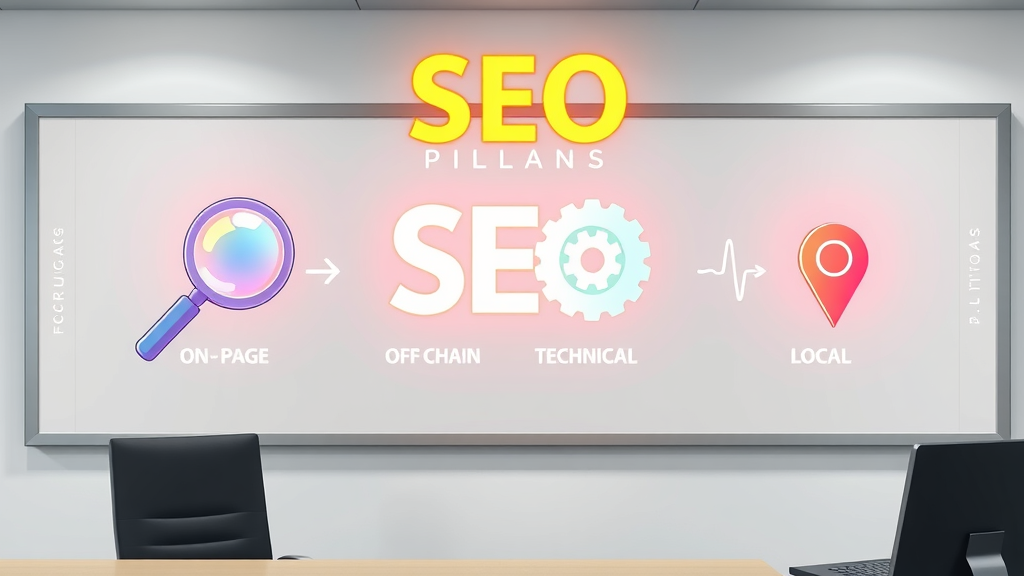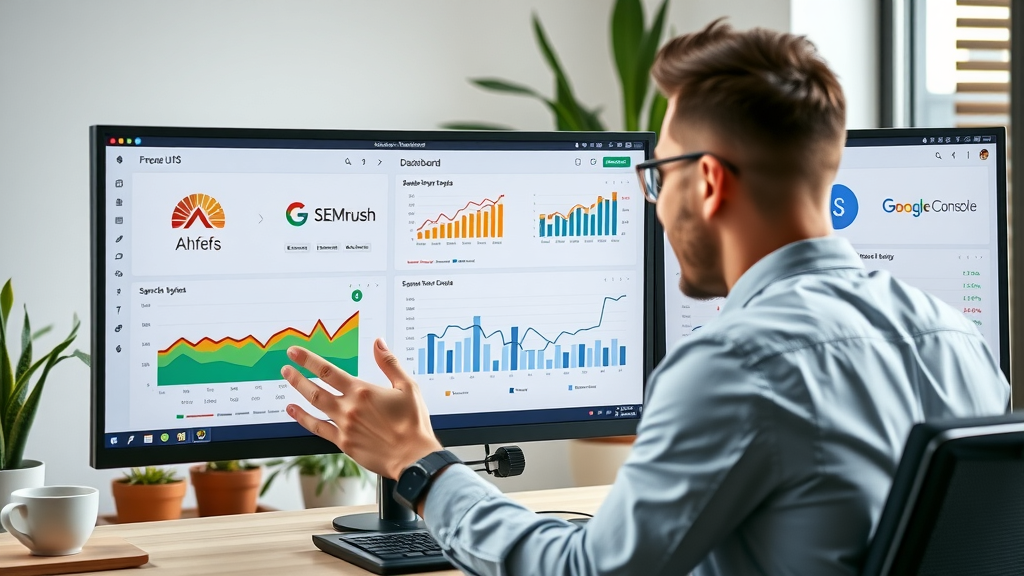Did you know that 93% of all online experiences begin with a search engine? This simple statistic reveals a powerful truth: search engine optimization (SEO) is the golden ticket for capturing valuable organic traffic and expanding your business footprint fast. Whether you’re a beginner, a business owner, or a seasoned marketer, mastering SEO is your key to sustained online growth. In this guide, you’ll discover actionable strategies, modern SEO tools, and proven techniques that put your website at the top of search engine results—quickly and effectively.
Unlocking Growth: The Power of Search Engine Optimization

- Did you know that 93% of all online experiences begin with a search engine? Unearthing startling facts like this sheds light on how critical search engine optimization is to capturing organic traffic and business growth. This guide reveals everything you need to master search engine optimization quickly—and effectively—no matter your current skill level.
Search engine optimization is more than just a digital marketing buzzword—it's a core business strategy that drives growth and success. By tapping into SEO, businesses unlock a reliable stream of organic search traffic that not only boosts conversion rates but also enhances brand credibility. The rapid evolution of search engines like Google has pushed SEO far beyond stuffing web pages with keywords; it now involves analytics, user experience, and technical excellence. Optimizing your site for search engine rankings places your business in front of a targeted audience precisely when they’re searching for your products or services.
In practical terms, harnessing the power of SEO means outcompeting rivals in the most visible digital real estate: the search engine results page (SERP). Proper SEO implementation ensures you capture valuable traffic, drive qualified leads, and increase your market share—all while keeping customer acquisition costs in check. The right engine optimization strategy can turn a fledgling site into an industry leader nearly overnight, provided you follow the best practices outlined throughout this comprehensive guide.
As you build your SEO foundation, it's important to remember that optimizing your website goes hand-in-hand with technical improvements and on-page enhancements. For a deeper dive into actionable website optimization strategies that complement your SEO efforts, explore the website optimization techniques and best practices that can further elevate your site's performance and user experience.
Your Roadmap to Mastering Search Engine Optimization
- Gain a solid understanding of core search engine optimization principles
- Learn actionable steps for keyword research, technical SEO, and building user experience
- Discover how modern seo tools and strategies can elevate your visibility
- Get insight from expert quotes and latest statistics

This guide is designed for clarity and results. By following each section, you will build a strong foundation in search engine optimization, armed with the latest industry insights and a step-by-step action plan. Expect to come away with the skills needed to conduct keyword research, optimize your web page structure, refine meta descriptions, leverage technical SEO, and utilize leading SEO tools for ongoing success.
Ready to become an SEO pro? Let’s dive deep into the nuts and bolts of mastering search engine optimization and turning your website into a powerhouse for organic search visibility.
Understanding Search Engine Optimization: Definition and Importance
What is meant by Search Engine Optimization?
Search engine optimization (SEO) refers to the strategies and techniques used to increase a website’s visibility on search engines such as Google or Bing. The aim is to achieve higher rankings in search engine results pages (SERPs) for relevant keywords, resulting in more organic (unpaid) web traffic. When SEO is executed effectively, your website appears higher on the results page, making it easier for potential customers to find what you offer and ultimately helping you increase conversions while lowering marketing expenditures.

SEO is essential because the vast majority of online activity begins with search engines. Optimizing your web pages ensures that your site meets the evolving ranking algorithm requirements and aligns with user search queries, leading to increased engine rankings and sustained visibility. Businesses that invest in search engine optimization often experience consistent traffic to their site and enjoy an advantage in market share, setting themselves apart from competitors who neglect their online presence.
How Search Engines Rank Web Content
- How do search engines like Google index, rank, and deliver web pages?
- Key search engine ranking factors for search engine optimization
- The role of meta descriptions, title tags, and keyword research
Search engines use automated bots (or crawlers) to scan and index billions of web pages across the internet. These crawlers analyze a site’s content, meta description, title tag, and overall site structure to understand and catalog its subject matter in the search engine’s database. When a user enters a search query, complex algorithms go to work. They evaluate hundreds of ranking factors—such as relevance, quality of content, link authority, user experience, and mobile responsiveness—to determine which pages rank highest on the search results page.

The importance of technical SEO lies in making your website accessible and understandable to these search engines. Elements like fast-loading pages, mobile-friendliness, and strategic keyword research help your site climb the search engine rankings. Effective optimization of title tags and meta descriptions can boost your click-through rates and attract more organic search traffic, while high-quality multimedia and internal links further strengthen your page’s authority and user appeal. Keeping abreast of algorithm changes is critical, as even a minor update can dramatically impact engine rankings and your SEO work overall.
Search Engine Algorithms and Their Impact on Search Engine Optimization
Search engines use complex algorithms to evaluate web pages. These algorithms consider factors like keyword relevance, site authority, mobile responsiveness, and links to determine how to rank search results. Changes in algorithms can significantly influence search engine optimization strategies.
"SEO is not about gaming the system; it’s about learning how to play by the rules for long-term sustainable growth." – Industry Expert
The Four Pillars of Search Engine Optimization
What are the 4 types of SEO?
The four main types of search engine optimization include:
- On-page SEO: Optimizing individual web pages for keywords, meta descriptions, and content quality
- Off-page SEO: Gaining backlinks and optimizing for social media signals
- Technical SEO: Ensuring your website’s infrastructure supports search engine crawling and indexing
- Local SEO: Optimizing for local search engine results, often leveraging Google My Business profiles.

Each pillar plays a unique role in ensuring that a site is highly discoverable in search results. On-page SEO focuses on making your content and meta elements as relevant and valuable as possible. Off-page SEO builds your reputation through credible backlinks and social media engagement. Technical SEO underpins your entire site’s visibility by addressing site speed, mobile optimization, and structured data. Local SEO zeroes in on attracting nearby users and dominating location-based search queries. Together, these four areas form the foundation of any robust search engine optimization plan.
Understanding and executing on these pillars is the difference between fleeting success and long-term digital dominance. By balancing your efforts across all four, you ensure your site stands strong against algorithm changes and changing user behaviors—delivering a seamless user experience while achieving consistently high search engine rankings.
Getting Started: How to Do SEO as a Beginner
How to do SEO as a beginner?
Beginners can start with these essential steps for search engine optimization:
- Conduct keyword research to identify valuable search queries
- Optimize your content with clear meta descriptions and headings
- Focus on user experience and mobile readiness
- Monitor performance with seo tools such as Google Analytics
Launching your SEO journey can feel overwhelming, but even basic engine optimization has a huge impact when executed well. Start by auditing your website’s content and learning which keywords your target audience uses on search engines. Craft title tags and meta descriptions that match those search queries closely, ensuring your web page stands out on the engine results page. As part of your on-page SEO work, prioritize clarity and value within your content to increase dwell time and retention.
Technical SEO doesn’t have to be intimidating. Focus on mobile-friendliness, improve page speed, and set up a streamlined navigation structure that allows both users and crawlers to move through your site easily. Don’t forget to leverage free seo tools—like Google Search Console and keyword research software—to gather insights and track your search engine rankings over time. As you gain experience, refine your tactics using the actionable metrics these tools provide.
Essential SEO Tools for Search Engine Optimization
- Popular free and paid seo tools for effective engine optimization
- Overview of Keyword research tools, technical SEO helpers, and analytics suites
| SEO Tool | Purpose | Best For |
|---|---|---|
| Ahrefs | Keyword/Backlink Analysis | All Levels |
| SEMrush | Comprehensive SEO Suite | Advanced |
| Google Search Console | Site Performance Tracking | Beginner+ |

Choosing the right SEO tool is essential for effective SEO work. Beginners may prefer Google Search Console for its user-friendly interface and integration with other Google services. Advanced marketers often turn to Ahrefs and SEMrush for comprehensive keyword research, competitor analysis, and technical site audits. These seo tools help you track the performance of web pages, uncover link-building opportunities, analyze traffic to your site, and make informed decisions to refine your SEO strategies.
Combining multiple seo tools enables deeper engine optimization, allowing you to stay on top of technical SEO requirements, discover new target keywords, monitor backlinks, and keep a close eye on your search engine ranking progress. Whether you're just starting or scaling up established SEO work, leveraging these tools saves time and maximizes your results in an ever-competitive online marketplace.
Keyword Research: The Foundation of Search Engine Optimization
- How to use keyword research to inform your search engine optimization
- Difference between short-tail and long-tail keywords
- Tips for finding intent-driven keywords using seo tools
Effective keyword research is the engine that drives successful search engine optimization campaigns. By understanding what your target audience is searching for—their language, intents, and frequency—you can ensure your website addresses those needs directly, making it more relevant in the eyes of search engines. Differentiate between short-tail keywords (broad terms, high volume, high competition) and long-tail keywords (specific phrases, lower volume, easier to rank for). Smart keyword research enables you to capture high-intent search queries and reduce wasted effort targeting unattainable terms.
Choosing the Right Keywords for Search Engines
Keyword research involves analyzing what your audience is searching for, how often those terms are searched, and identifying related keywords that can drive more traffic to your website. Using the right keywords directly improves your search engine optimization success.
Begin by brainstorming seed keywords and expanding them using SEO tools like Ahrefs, SEMrush, or Google's Keyword Planner. Look for patterns in user search queries that signal commercial or informational intent. Integrate your chosen keywords naturally within content, headline tags, and meta descriptions—not only to rank higher on search engines but to increase user engagement and dwell time on your web pages. Remember, intent-driven keywords will yield the most qualified and convertible traffic to your site.
Technical SEO: Enhancing Website Foundations for Search Engine Optimization
- What is technical seo and how does it impact search engine optimization?
- The importance of site speed, mobile-friendliness, secure HTTPS, and structured data
- Tools for performing technical seo audits

Technical SEO forms the backbone of your website’s visibility in search engine results. It ensures your site’s structure, speed, and accessibility meet both search engines’ and users’ expectations. Site speed and mobile-friendliness are now core web vitals for Google’s ranking algorithm, directly affecting your ability to rank higher on the engine results page. Securing your site with HTTPS, implementing structured data for rich snippets, and maintaining a clear sitemap all contribute to a more crawlable and indexable web page.
A technical SEO audit, using tools like Google Search Console or Screaming Frog, is vital for identifying crawl errors, duplicate content, slow-loading pages, and broken links. Addressing these issues not only improves your engine rankings but also ensures a superior user experience—an increasingly important ranking signal for search engines.
Optimizing Meta Descriptions and Site Architecture
Effective meta descriptions can increase click-through rates in search results. Combined with clean site architecture and internal linking, they create a solid foundation for improved search engine optimization.
Think of meta descriptions as your web page’s sales pitch for search engines: they should be concise, compelling, and packed with the main keyword. Likewise, crafting a logical site structure with clear navigation and strategic internal links allows both crawlers and visitors to discover your best content with ease, leading to higher engagement metrics and sustained search engine ranking improvements.
On-Page Optimization Techniques for Search Engine Optimization
- How to improve content quality for search engine optimization
- Using headings, keyword density, and multimedia
- Optimizing images with alt tags and other on-page SEO best practices

On-page optimization is all about making your web pages irresistible to both users and search engines. Start with strong, keyword-rich headings (H1, H2, H3) that make your content easier to scan and more relevant to ranking algorithms. Maintain a healthy keyword density that signals topic authority without triggering penalties for keyword stuffing. Add value to your content with multimedia—images, videos, infographics—and always use descriptive alt tags to help search engines index your visuals while enhancing accessibility.
Beyond content, ensure title tags and meta descriptions are unique and crafted to drive clicks from the search engine results page. Use internal links to guide users and bots to your most important resources, and update older content to meet evolving SEO standards, keeping your site fresh and competitive.
Monitor your on-page SEO work regularly through tools like Google Analytics and Search Console to identify opportunities for further optimization. Small on-page tweaks can have an outsized impact on your search engine results and boost traffic to your site consistently over time.
User Experience and Its Relationship to Search Engine Optimization
- How user experience (UX) boosts search engine optimization
- Site navigation, page speed, and accessibility explained
- Case studies: User engagement and ranking improvements
"User experience is at the center of modern search engine optimization—satisfied users fuel top rankings." – SEO Specialist

Search engines increasingly reward sites that prioritize user experience: fast page loads, intuitive menus, and accessible designs correlate directly with higher engine rankings. Clear site navigation helps users find information effortlessly, reducing bounce rates and encouraging deeper interaction with your content. Enhancing usability not only increases satisfaction for visitors but also aligns your site with Google’s focus on core web vitals, giving you a measurable SEO work advantage.
Accessibility matters for all users, including those with disabilities. By adhering to accessibility guidelines—alt tags, readable fonts, and proper color contrast—you signal to search engines that your web pages are inclusive and valuable for a wider audience. As a result, user engagement metrics like time on site and pages per visit see noticeable improvements, reinforcing your site’s authority in the eyes of both users and algorithms.
Leading sites conduct regular user experience audits and A/B testing to stay ahead of evolving expectations. Case studies consistently show that sites investing in UX improvements see strong gains in rankings and conversions—demonstrating that user experience and search engine optimization now go hand-in-hand for lasting digital growth.
Off-Page Optimization: Building Trust for Search Engine Optimization
- Backlinks: Why they matter for search engine optimization
- The role of social media, content promotion, and reputation management
- Outreach strategies for acquiring high-quality links
Off-page search engine optimization is about earning trust and demonstrating authority in your niche—two essential ingredients for climbing search engine results pages. Backlinks from reputable websites act as votes of confidence, signaling to engines like Google that your content is worthy of attention. These links, combined with positive social media signals and a strong reputation, drive organic search rankings upward while inviting more visitors to your web page.
Effective off-page SEO work includes guest posting, influencer collaborations, digital PR, and strategic link-building campaigns. Reputation management—encouraging customer reviews and maintaining an active presence on trusted directories—can positively amplify your site’s credibility. Social media platforms, though not direct ranking factors, still play a crucial role in content distribution and brand visibility, leading to natural, high-quality backlink acquisition as your reach grows.
Leveraging Social Media for Search Engine Optimization
Although social media shares are not direct ranking factors, maintaining an active social presence can increase content reach, earn natural links, and support your overall search engine optimization strategy.
Promoting your content across Twitter, LinkedIn, Facebook, and Instagram can generate engagement, extend your brand’s influence, and foster authentic relationships with both your audience and fellow site owners within your industry. Social sharing can also expose your web page to bloggers, journalists, and content creators who may naturally link to your site—boosting your backlink profile in the process.
Local SEO: Tailoring Search Engine Optimization for Community Visibility
- Strategies for optimizing Google Business profiles
- Gathering reviews, citations, and verifying business information
- Local keywords and geo-targeted content for search engines
| Task | Description |
|---|---|
| Google My Business | Complete & Verify Profile |
| Local Citations | Consistent NAP Across Platforms |

Local SEO connects your business with customers in your immediate community through targeted optimization strategies. Start by claiming and completing your Google My Business profile , ensuring details like name, address, phone (NAP), and hours are accurate and consistent across platforms. Local citations, gained through directory listings and local content, further cement your visibility on the search engine results page for geo-targeted searches.
Gather as many authentic customer reviews as possible, as positive feedback builds trust with both new customers and search engines. Don’t overlook local keyword research—integrate your town, city, or neighborhood into web page titles, meta descriptions, and content. This geo-specific approach helps you stand out in local engine rankings and dominate community-based search results, giving your business an edge in high-conversion local searches.
Measuring SEO Work: Analytics and Success Metrics for Search Engine Optimization
- Top metrics to track search engine optimization progress
- Using Google Analytics, Search Console, and third-party seo tools
Ongoing measurement is essential to ensure your search engine optimization efforts translate into tangible business outcomes. Track key performance indicators (KPIs) such as organic search traffic, keyword rankings, bounce rate, click-through rates, and conversion rates using analytics platforms like Google Analytics and Google Search Console. These tools provide actionable insights into how users interact with your site and where you can further optimize for improved engine results.
Third-party seo tools such as SEMrush and Ahrefs offer advanced analytics, competitive benchmarking, and comprehensive reporting features for deeper analysis. Set up goal tracking and link data to business objectives, so you can see the true return on investment (ROI) from your SEO work. By continuously analyzing your results, you’ll uncover opportunities to fine-tune your strategy and maintain your edge on the search engine results page.
Staying Ahead: Trends and Best Practices in Search Engine Optimization
- Future-proof your strategies for search engine optimization
- The rise of voice search, AI, and core web vitals
- Ongoing education, forums, and resource platforms

SEO is a fast-moving field shaped by advances in technology and shifts in user behavior. Modern trends such as voice search , AI-driven content recommendations, and Google’s core web vitals all require you to stay proactive with your engine optimization strategy. Adapting to these changes means ensuring your site is mobile-optimized, implementing schema markup for rich snippets, and prioritizing fast, intuitive user experiences.
Continuous learning is vital: follow industry forums, subscribe to trusted SEO blogs, and invest in online courses to keep pace with search engines’ evolving algorithms. Developing a flexible SEO work plan ensures your marketing strategies remain effective and future-proof, enabling your business to thrive in the ever-changing digital landscape.
How Can I Do SEO By Myself?
With the right approach and the right seo tools, you can master search engine optimization on your own by following tested processes:
- Learn from free resources and credible blogs
- Use beginner-friendly seo tools
- Experiment and track your results
- Join online communities for support
- Audit your website and identify opportunities
- Choose keywords that deliver value
- Write compelling meta descriptions
- Optimize for a great user experience
- Track performance and adapt strategies
Even without a large team or agency budget, individuals can achieve impressive results. The key is dedication—auditing your existing web pages, researching effective search queries, implementing optimization best practices, and tracking changes over time. Consistently iterating and learning from analytics ensures continued growth and success in search engine optimization.
Frequently Asked Questions on Search Engine Optimization
- What is search engine optimization’s ROI? SEO offers a high potential ROI because organic traffic is both cost-effective and long-lasting compared to paid marketing strategies. While results may take time, ongoing SEO work accumulates value, improving your site’s engine rankings and resulting in compounding returns.
- How long does search engine optimization take? SEO is a long-term strategy, typically showing significant results within three to six months. Timelines vary depending on competition, site history, and the consistency of optimization efforts, but steady improvements in search engine ranking and web page performance are common over time.
- Why is mobile optimization essential for search engines? More than half of all web traffic now comes from mobile devices, and search engines reward sites that deliver a superior mobile experience with higher engine results. Mobile-optimized sites load faster, keep users engaged, and are more likely to earn top rankings, so mobile readiness is a must.
- How does search engine optimization interact with paid search? SEO and paid search can work hand in hand. Effective SEO drives consistent organic traffic, while PPC delivers instant visibility. Combining both strategies increases your reach on the search engine results page and can provide valuable insights into converting keywords and user behavior.
Key Insights for Search Engine Optimization Excellence
- Focus on both users and search engines
- Balance on-page, off-page, and technical SEO
- Leverage modern seo tools for convenience and tracking
- Continuous learning yields lasting search engine optimization results
Delivering superior content and a frictionless experience for users remains the best way to satisfy search engine algorithms. Combine this user-first mindset with technical expertise and in-depth keyword research to keep your site at the top of the engine results page over the long haul.
Final Steps to Master Search Engine Optimization and Accelerate Your Growth
- Implement the techniques covered in this guide for comprehensive search engine optimization improvements
- Stay updated with latest trends and algorithm updates
- Schedule a free strategy session today for custom advice: https://hub.prospectrocket.com/AR/eymcalendar
Start today—master search engine optimization by taking focused action, adapting to change, and committing to continuous improvement for fast, sustainable traffic growth.
If you’re ready to take your SEO journey even further, consider exploring a broader perspective on digital marketing and how search engine optimization fits into your overall growth strategy. The comprehensive SEO resource hub offers advanced insights, industry updates, and expert guidance to help you stay ahead of the curve. Whether you’re seeking to refine your tactics or integrate SEO with other marketing channels, these resources will empower you to make smarter decisions and achieve lasting results. Dive deeper and unlock the next level of your online success.
To deepen your understanding of search engine optimization (SEO) and enhance your website’s performance, consider exploring the following resources:
-
“What Is SEO? Meaning, Examples & How to Optimize Your Site” : This comprehensive guide from Semrush delves into various SEO strategies, including on-page, off-page, and technical SEO, providing actionable insights to improve your site’s visibility. ( semrush.com )
-
“A Smashing Guide To The World Of Search Engine Optimization” : Published by Smashing Magazine, this article offers an in-depth look at structured data and its role in enhancing search engine understanding of your content, which can lead to richer search results. ( smashingmagazine.com )
By integrating the strategies and insights from these authoritative sources, you can effectively boost your website’s search engine rankings and drive more organic traffic.
 Add Row
Add Row  Add
Add 




Write A Comment